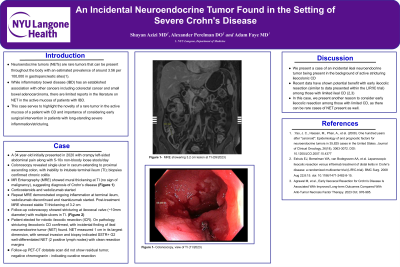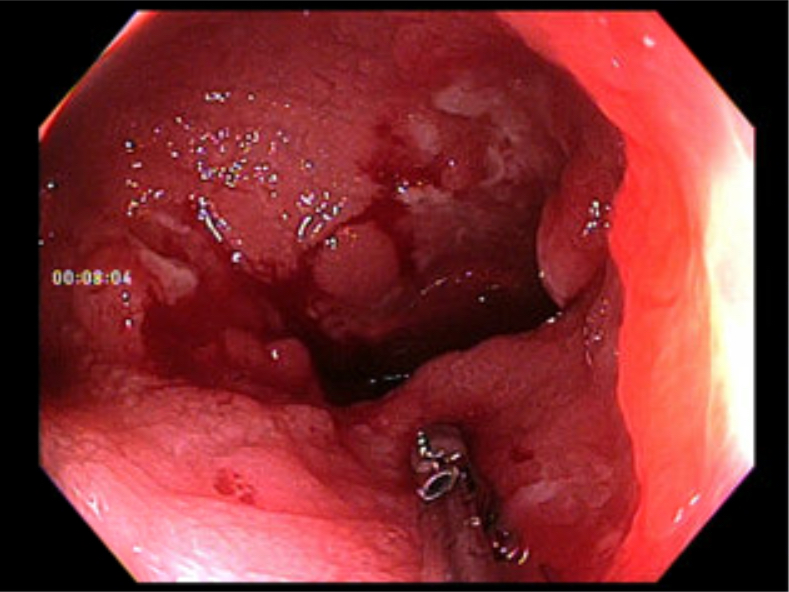Sunday Poster Session
Category: IBD
P0998 - An Incidental Neuroendocrine Tumor Found in the Setting of Severe Crohn's Disease
Sunday, October 27, 2024
3:30 PM - 7:00 PM ET
Location: Exhibit Hall E

Has Audio

Shayan Azizi, MD
NYU Langone Health
New York, NY
Presenting Author(s)
Shayan Azizi, MD1, Alexander Perelman, DO, MS2, Adam S.. Faye, MD3
1NYU Langone Health, New York, NY; 2New York University Langone Health, New York, NY; 3NYU Grossman School of Medicine, New York, NY
Introduction: Neuroendocrine tumors (NETs) are rare tumors with no established association with inflammatory bowel disease (IBD). We present a case of an incidentally found NET in a patient with stricturing ileocolonic Crohn’s disease (CD).
Case Description/Methods: A 34 year-old initially presented in 2020 with crampy left-sided abdominal pain along with 5-10x non-bloody loose stools/day. On labs, C-reactive protein was elevated to 26. Colonoscopy revealed a single ulcer in the cecum extending to the proximal ascending colon, with an inability to intubate the terminal ileum (TI); biopsies confirmed chronic colitis. MR Enterography (MRE) was then performed which showed mural thickening at the TI (no sign of malignancy), suggesting likely a diagnosis of CD. Corticosteroids and vedolizumab were ultimately started. Repeat colonoscopy in Nov. 2021 demonstrated mild colitis in cecum and a similar inability to intubate the terminal ileum. Repeat MRE demonstrated ongoing inflammation at the terminal ileum, at which point vedolizumab was discontinued and risankizumab was started. Post-treatment MRE showed stable TI thickening of 3.2 cm, compared to MRE done two years prior. Patient was then evaluated at the IBD clinic, at which time follow-up colonoscopy showed stricturing at the ileocecal valve (~10mm diameter) with multiple ulcers in the TI. In discussion with the patient, an ultimate decision was made to proceed with a robotic ileocolic resection (ICR). On pathology, stricturing ileocolonic CD was confirmed, with an incidental finding of ileal neuroendocrine tumor (NET) found. The NET measured 1 cm in its largest dimension, with serosal invasion and biopsy indicated a SSTR+ G2 well-differentiated NET (2 positive lymph nodes) with clean resection margins. Follow-up PET-CT dotatate scan did not show any residual tumor, with negative chromogrannin as well-indicating curative resection.
Discussion: We present a case of an incidental ileal neuroendocrine tumor being present in the background of active stricturing ileocolonic CD. Recent data have shown potential benefit with early ileocolic resection (similar to data presented within the LIR!IC trial) among those with limited ileal CD. In this case, we present another reason to consider early ileocolic resection among those with limited CD, as there can be rare cases of NET present as well.

Disclosures:
Shayan Azizi, MD1, Alexander Perelman, DO, MS2, Adam S.. Faye, MD3. P0998 - An Incidental Neuroendocrine Tumor Found in the Setting of Severe Crohn's Disease, ACG 2024 Annual Scientific Meeting Abstracts. Philadelphia, PA: American College of Gastroenterology.
1NYU Langone Health, New York, NY; 2New York University Langone Health, New York, NY; 3NYU Grossman School of Medicine, New York, NY
Introduction: Neuroendocrine tumors (NETs) are rare tumors with no established association with inflammatory bowel disease (IBD). We present a case of an incidentally found NET in a patient with stricturing ileocolonic Crohn’s disease (CD).
Case Description/Methods: A 34 year-old initially presented in 2020 with crampy left-sided abdominal pain along with 5-10x non-bloody loose stools/day. On labs, C-reactive protein was elevated to 26. Colonoscopy revealed a single ulcer in the cecum extending to the proximal ascending colon, with an inability to intubate the terminal ileum (TI); biopsies confirmed chronic colitis. MR Enterography (MRE) was then performed which showed mural thickening at the TI (no sign of malignancy), suggesting likely a diagnosis of CD. Corticosteroids and vedolizumab were ultimately started. Repeat colonoscopy in Nov. 2021 demonstrated mild colitis in cecum and a similar inability to intubate the terminal ileum. Repeat MRE demonstrated ongoing inflammation at the terminal ileum, at which point vedolizumab was discontinued and risankizumab was started. Post-treatment MRE showed stable TI thickening of 3.2 cm, compared to MRE done two years prior. Patient was then evaluated at the IBD clinic, at which time follow-up colonoscopy showed stricturing at the ileocecal valve (~10mm diameter) with multiple ulcers in the TI. In discussion with the patient, an ultimate decision was made to proceed with a robotic ileocolic resection (ICR). On pathology, stricturing ileocolonic CD was confirmed, with an incidental finding of ileal neuroendocrine tumor (NET) found. The NET measured 1 cm in its largest dimension, with serosal invasion and biopsy indicated a SSTR+ G2 well-differentiated NET (2 positive lymph nodes) with clean resection margins. Follow-up PET-CT dotatate scan did not show any residual tumor, with negative chromogrannin as well-indicating curative resection.
Discussion: We present a case of an incidental ileal neuroendocrine tumor being present in the background of active stricturing ileocolonic CD. Recent data have shown potential benefit with early ileocolic resection (similar to data presented within the LIR!IC trial) among those with limited ileal CD. In this case, we present another reason to consider early ileocolic resection among those with limited CD, as there can be rare cases of NET present as well.

Figure: A follow-up colonoscopy showing stricture at the ileocecal valve with multiple ulcers in the terminal ileum.
Disclosures:
Shayan Azizi indicated no relevant financial relationships.
Alexander Perelman indicated no relevant financial relationships.
Adam Faye: Abbvie – Consultant. BMS – Consultant. Takeda – Education Seminar.
Shayan Azizi, MD1, Alexander Perelman, DO, MS2, Adam S.. Faye, MD3. P0998 - An Incidental Neuroendocrine Tumor Found in the Setting of Severe Crohn's Disease, ACG 2024 Annual Scientific Meeting Abstracts. Philadelphia, PA: American College of Gastroenterology.
